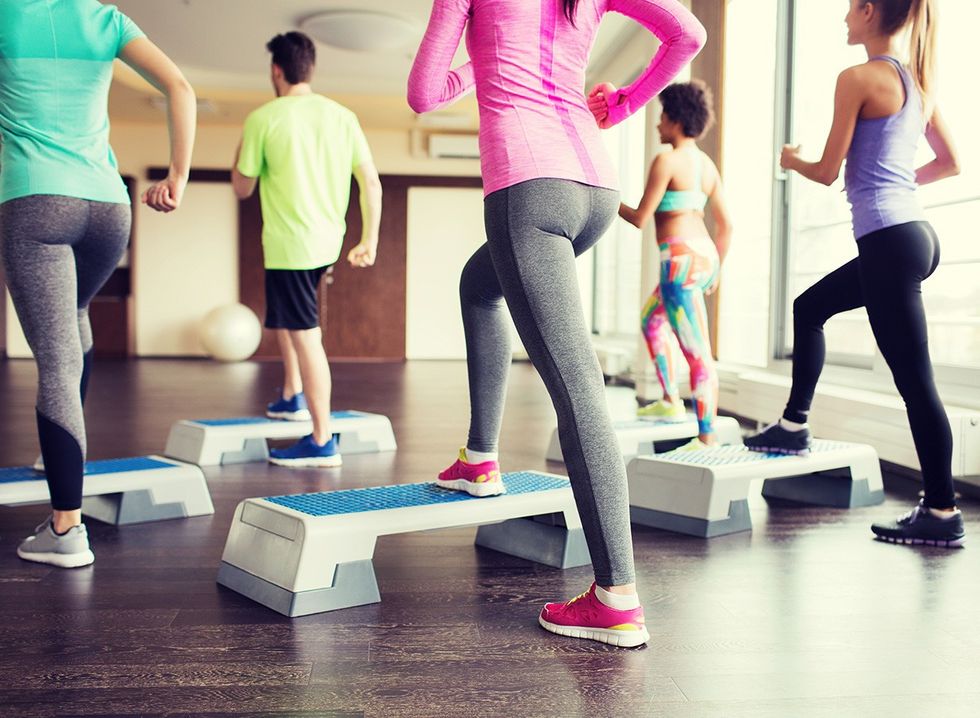Weight is a common challenge for women going through the menopause transition. Many of the hormone changes you experience as part of menopause are actually significant contributors to weight struggles. Hormone replacement therapy, if it’s the right course of treatment for you, has the potential to set you up for success by improving symptoms that make it easier to gain weight and harder to lose it. Remember: Any approach to sustained weight loss should be multifaceted, encompassing various elements that contribute to your overall well-being. So, while diet and exercise are important, so are addressing hormones, reducing stress, and prioritizing sleep.
Dietary Changes for Weight Loss During Menopause

To effectively manage your weight during menopause, you’ll need a diet that serves your body’s new normal. By making informed dietary decisions, you can look and feel your best. Before starting any new diet, always check with your doctor.
Nutritional Needs for Menopausal Women

Focusing on nutrition becomes crucial during menopause to align with your body's changing energy needs, especially on a weight loss journey. “If you’re losing weight, you’re losing muscle mass,” says Dr. Jordan. “As you eat less, what you eat matters even more because you still need to feed your entire body—from your bones to your skin—with healthy nutrients.”
Focus on Nutrient Dense Foods

Focus on nutrient-dense foods that offer the most bang for their buck, and avoid empty calories from processed snacks and added sugars. If you haven’t already, learn about macronutrients and their role in nutrition, because while most of us turn to calorie counting as the go-to method for tracking intake, focusing on your macros is often more effective. Carbohydrates from whole grains, proteins from lean sources, and healthy fats from foods like avocados and nuts can help you sustain your energy levels and maintain muscle mass.
Get Enough Vitamin D and Calcium

A diet rich in vitamin D and calcium is also important during this time to help preserve bone health. Osteoporosis is common among postmenopausal women and can lead to fractures and breaks, if not addressed.
Consume These Foods

A plant-centric diet rich in fruits, vegetables, and whole grains provides vital nutrients and fiber. These foods help support digestive health, regulate blood sugar levels, and contribute to a feeling of fullness, making them valuable tools for maintaining a healthy weight. Lean proteins, such as poultry, fish, tofu, and legumes, are excellent choices to preserve muscle mass and stabilize your iron levels.
Avoid These Foods

Processed foods and added sugars, on the other hand, can contribute to weight gain. That doesn’t have to mean constantly depriving yourself (sometimes, a scoop of ice cream can be exactly what you need after a hot flash). Just be conscious about the meals you choose and stock up on healthier snacks, like carrot sticks, hummus, guacamole, and whole fruit, so you’ve always got a feel-good option to grab when you’re hungry.
The Role of Portion Control

Another vital facet of nutrition during menopause is being more mindful of when and how much you eat. Many of us eat out of boredom or to self-comfort—and while this can feel good in the moment, it can also compound hormonal weight gain. Planning your portions and eating mindfully can nurture a more well-rounded relationship with food and your body.
The Role of Mindful Eating

Mindful eating involves being fully present during meals, savoring each bite, and paying attention to hunger and fullness cues. This practice also helps you to eat slower, enjoy your food more, and prevent overeating by giving your body more time to signal to you that you’re full. If you’re prone to emotional eating, learning to differentiate between actual hunger cues and emotional triggers will be important. Your body may react to stressful situations with a phantom appetite, even if you don’t need any nutrients at that time. Talk to your doctor, a nutritionist, or a Midi clinician about recognizing and overcoming these triggers and what to do when the emotional urge to eat strikes.
RELATED: 15 Quick Ways to Lose Body Fat Percentage in a Week
Exercise and Physical Activity

Staying active is important when you’re going through menopause. And it’s about more than just weight loss. By staying active and exercising regularly, you’re investing in your future mobility. Even if you haven’t been much of a gym-goer before now, this is the perfect time to explore new fitness routines.
Best Exercises for Menopausal Women

Aerobic exercise and strength training are important throughout life, especially during menopause, thanks to their cardiovascular benefits. From brisk walking to running to cycling, any activity that gets your heart rate up counts. And regularly engaging in exercises with weights or resistance bands helps keep your muscles strong and limber. Building and maintaining muscle supports metabolism and contributes to your overall strength and energy.
Stretching

Incorporate some flexibility exercises into your routine, too. Stretching helps stabilize your joints and prevent aches and pains as you age. Yoga and Pilates, for instance, not only improve flexibility, but they also enhance balance, stability, and overall joint health.
Overcoming Exercise Barriers in Menopause

Creating a regular exercise routine during menopause is easier said than done—especially if you experience joint pain, feel chronically tired, or have other barriers to traditional exercise. Your doctor may recommend physical therapy before starting a new fitness routine, especially if you have prior injuries or conditions that could make working out unsafe.
Joint Pain

Joint pain is common during menopause, but you can mitigate some discomfort by easing into high-impact exercises, such as weight lifting, running, or HIIT, once your body is strong enough. If you’re experiencing aches and soreness, make sure you’re stretching consistently and safely. Even if you just do some yoga on your living room floor, stretching and expanding the muscles around your joints helps alleviate soreness and improves mobility.
Hormone Replacement Therapy

Hormone replacement therapy (HRT) may also bring relief from joint pain. That’s because estrogen plays a key role in overall joint health, so when levels drop during midlife, you might notice that once-supple spots feel tight and sore. If you’re a good candidate for HRT, it can often improve that stiffness and discomfort, making it easier to exercise.
Mental Obstacles

And let’s face it: Another common hurdle to building a menopausal fitness routine is not physical, but mental. It’s not always easy to feel motivated to exercise. Don’t beat yourself up. Instead, focus on creating a routine you actually look forward to. Maybe that means inviting a friend to meet you for a workout class or scheduling a weekend walk with a neighbor. Buddy up and you’ll start looking forward to fitness dates (and stop canceling on yourself).
Lifestyle Modifications for Weight Loss During Menopause

Just like everything in life, there’s no single easy solution to menopausal weight gain. Effectively managing your weight through menopause and beyond requires a comprehensive and holistic approach. Exercise and diet are two important components, but they aren’t the only ones.
Sleep

Quality sleep is integral to overall health, and its impact on weight during menopause is significant. Since menopause symptoms can often lead to poor or interrupted sleep, you may notice that you wake up feeling less rested. What’s more, disrupted sleep patterns can influence hormones, potentially leading to increased cravings and weight gain. Prioritizing good sleep hygiene, which includes maintaining a consistent sleep schedule and creating a peaceful sleep environment, can help ensure quality sleep and, as a result, better weight management. If your menopause symptoms are causing regular insomnia, ask your doctor or a Midi clinician for guidance.
Medical and Professional Support

Many women simply accept their menopause symptoms, including weight gain, as one more non-negotiable part of aging. In fact, according to some studies, less than 30% of women seek help for their symptoms at all. At Midi, we encourage the opposite: consulting actively with healthcare providers while going through menopause..
When to Seek Medical Advice

It’s important to recognize if weight gain becomes a health concern during menopause. Putting on pounds can lead to other health issues and shouldn’t be ignored. Talk to your doctor if you gain significant weight, especially if it happens within just a few months.
RELATED: This Plan Is How to Lose 5 Percent Body Fat In 2 Weeks
Conclusion

Even if your weight gain is more gradual and not an immediate medical concern, it’s still a good idea to loop your doctor in. Tracking and identifying your symptoms throughout menopause empowers your provider to give you the most personalized and practical recommendations and treatments. They may refer you to a nutritionist or physical therapist or recommend a fitness regimen tailored to your needs.
💪🔥Body Booster: If you are gaining menopausal weight, take a comprehensive look at your health – not just the food you are eating.
Kathleen Jordan, MD, is a specialist in midlife weight management for women and a Chief Medical Officer of Midi Health.















 Shutterstock
Shutterstock Shutterstock
Shutterstock Shutterstock
Shutterstock Shutterstock
Shutterstock Shutterstock
Shutterstock Shutterstock
Shutterstock Shutterstock
Shutterstock

 Shutterstock
Shutterstock Shutterstock
Shutterstock Shutterstock
Shutterstock Shutterstock
Shutterstock Shutterstock
Shutterstock

 Shutterstock
Shutterstock Shutterstock
Shutterstock Shutterstock
Shutterstock Shutterstock
Shutterstock Shutterstock
Shutterstock

 I'm a Nutritionist and These 9 High-Protein Snacks Keep My Clients Full While Losing 50 Pounds
I'm a Nutritionist and These 9 High-Protein Snacks Keep My Clients Full While Losing 50 Pounds
 Shutterstock
Shutterstock 2. Processed FoodsShutterstock
2. Processed FoodsShutterstock Shutterstock
Shutterstock Shutterstock/Prostock-studio
Shutterstock/Prostock-studio Shutterstock
Shutterstock Pro TipsShutterstock
Pro TipsShutterstock Shutterstock
Shutterstock Shutterstock
Shutterstock Shutterstock
Shutterstock Don’t Drink as Much AlcoholShutterstock
Don’t Drink as Much AlcoholShutterstock Most Women on GLP-1s Are Making a Few Common MistakesShutterstock
Most Women on GLP-1s Are Making a Few Common MistakesShutterstock Soda and Sugary DrinksShutterstock
Soda and Sugary DrinksShutterstock Shutterstock
Shutterstock Eat BreakfastShutterstock
Eat BreakfastShutterstock And Improve Insulin SensitivityShutterstock
And Improve Insulin SensitivityShutterstock Belly Flab Strip Tip: Sugar and Fat Calories Leave Its Mark on Your BodyShutterstock
Belly Flab Strip Tip: Sugar and Fat Calories Leave Its Mark on Your BodyShutterstock Shutterstock
Shutterstock The Drugs Mimic the GLP-1 Hormone Naturally Produced by the BodyShutterstock
The Drugs Mimic the GLP-1 Hormone Naturally Produced by the BodyShutterstock 3. Deep-Fried ItemsShutterstock
3. Deep-Fried ItemsShutterstock